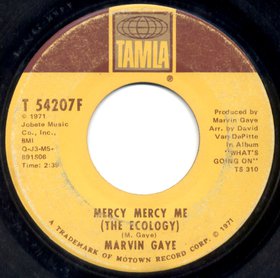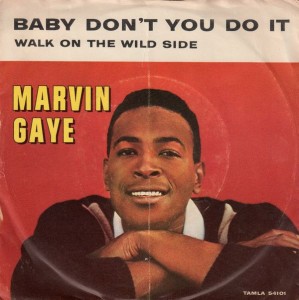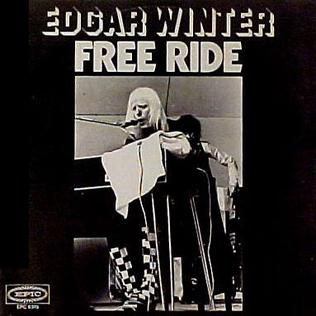
"Burning Love" is a 1972 song by Elvis Presley, written by Dennis Linde, originally released by Arthur Alexander earlier in 1972. Presley found major success with the song, it becoming his final Top 10 hit in the American Hot 100 or pop charts, peaking at No.2.

"Magic Carpet Ride" is a rock song written by John Kay and Rushton Moreve from the Canadian-American hard rock band Steppenwolf. The song was initially released in 1968 on the album The Second. It was the lead single from that album, peaking at number three in the US, and staying in the charts for 16 weeks, longer than any other Steppenwolf song.

"I Heard It Through the Grapevine" is a song written by Norman Whitfield and Barrett Strong for Motown Records in 1966. The first recording of the song to be released was produced by Whitfield for Gladys Knight & the Pips and released as a single in September 1967. It went to number one on the Billboard R&B Singles chart and number two on the Billboard Pop Singles chart and shortly became the biggest selling Motown single up to that time.

Let's Get It On is the thirteenth studio album by the American soul singer, songwriter, and producer Marvin Gaye. It was released on August 28, 1973, by the Motown subsidiary label Tamla Records on LP.

"What's Going On" is a song by American singer-songwriter Marvin Gaye, released in 1971 on the Motown subsidiary Tamla. It is the opening track of Gaye's studio album of the same name. Originally inspired by a police brutality incident witnessed by Renaldo "Obie" Benson, the song was composed by Benson, Al Cleveland, and Gaye and produced by Gaye himself. The song marked Gaye's departure from the Motown Sound towards more personal material. Later topping the Hot Soul Singles chart for five weeks and crossing over to number two on the Billboard Hot 100, it would sell over two million copies, becoming Gaye's second-most successful Motown song to date. It was ranked at number 4 in Rolling Stone's 500 Greatest Songs of all Time in 2004 and 2010.

"Got to Give It Up" is a song by American music artist Marvin Gaye. Written by the singer and produced by Art Stewart as a response to a request from Gaye's record label that he perform disco music, it was released in March 1977.

"Let's Get It On" is a song by soul musician Marvin Gaye, released June 15, 1973, on Motown-subsidiary label Tamla Records. The song was recorded on March 22, 1973, at Hitsville West in Los Angeles, California. The song features romantic and sexual lyricism and funk instrumentation by The Funk Brothers. The title track of Gaye's album of the same name, it was written by Marvin Gaye and producer Ed Townsend. "Let's Get It On" became Gaye's most successful single for Motown and one of his most well-known songs. With the help of the song's sexually explicit content, "Let's Get It On" helped give Gaye a reputation as a sex symbol during its initial popularity. "Let's Get It On" is written and composed in the key of E-flat major and is set in time signature of common time with a tempo of 82 beats per minute.

"Mercy Mercy Me (The Ecology)" is the second single from American singer-songwriter Marvin Gaye's 1971 album, What's Going On. Following the breakthrough of the title track's success, the song, written solely by Gaye, became regarded as one of popular music's most poignant anthems of sorrow regarding the environment. Led by Gaye playing piano, strings conducted by Paul Riser and David Van De Pitte, multi-tracking vocals from Gaye and the Andantes, multiple background instruments provided by the Funk Brothers and a leading sax solo by Wild Bill Moore, the song rose to number 4 on Billboard's Pop Singles chart and number one for two weeks on the R&B Singles charts on August 14 through to August 27, 1971. The distinctive percussive sound heard on the track was a wood block struck by a rubber mallet, drenched in studio reverb. The song also brought Gaye one of his rare appearances on the Adult Contemporary chart, where it peaked at number 34. In Canada, "Mercy Mercy Me" spent two weeks at number 9.

"You're All I Need to Get By" is a song recorded by the American R&B/soul duo Marvin Gaye and Tammi Terrell and released on Motown Records' Tamla label in 1968. It was the basis for the 1995 single "I'll Be There for You/You're All I Need to Get By" from Method Man and Mary J. Blige.

"Ain't Nothing Like the Real Thing" is a 1968 single released by American R&B/soul duo Marvin Gaye and Tammi Terrell, on the Tamla label in 1968. The B-side of the single is "Little Ole Boy, Little Ole Girl" from the duo's United LP. The first release off the duo's second album: You're All I Need, the song—written and produced by regular Gaye/Terrell collaborators Ashford & Simpson—became a hit within weeks of release eventually peaking at number eight on the US Billboard Hot 100 and number one on the Hot Soul Singles chart, the first of the duo's two number-one R&B hits. In the UK "Ain't Nothing Like the Real Thing" reached number 34.

"Ain't That Peculiar" is a 1965 song recorded by American soul musician Marvin Gaye for the Tamla (Motown) label.

"Distant Lover" is the sixth song issued on singer Marvin Gaye's 1973 album, Let's Get It On and the B-side of the second single from that album, "Come Get to This". A live recording was issued as a single in 1974. The live version of the song was Gaye's most successful single during the three-year gap between Let's Get It On and his following 1976 album, I Want You.

Trouble Man is a soundtrack and the twelfth studio album by American soul singer Marvin Gaye, released on December 8, 1972, on Motown-subsidiary label Tamla Records. As the soundtrack to the 1972 Blaxploitation film of the same name, the Trouble Man soundtrack was a more contemporary move for Gaye, following his politically charged album What's Going On. This was the first album to be written and produced solely by Gaye. The only other album recorded under his full creative control was In Our Lifetime, released in 1981.

"Baby Don't You Do It" is a 1964 single by American singer Marvin Gaye. Released on the Tamla label, this song discusses a man who is at a standstill with his girlfriend, who he feels is neglecting his love stating "Don't break my heart/...I've tried to do my best".
"You're the Man" is a song composed by singer Marvin Gaye and songwriter Kenneth Stover and released on the Motown subsidiary, Tamla, in the summer of 1972. Composed primarily on the basis of the 1972 presidential election, the song was supposedly the first release from Gaye's next album, You're the Man, but the song's modest success forced Gaye to shelve the album in protest.

"Stay" is a doo-wop song written by Maurice Williams and first recorded in 1960 by Williams with his group the Zodiacs. Commercially successful versions were later also issued by the Hollies, the Four Seasons and Jackson Browne.

"Free Ride" is a song written by Dan Hartman and performed by the Edgar Winter Group from their 1972 album They Only Come Out at Night, produced by Rick Derringer. The single was a top 15 U.S. hit in 1973, reaching number 14 on the Billboard Hot 100 and number 10 on Cash Box. In Canada, it peaked at number 8.

"Live and Let Die" is the theme song of the 1973 James Bond film of the same name, performed by the British–American rock band Wings. Written by English musician Paul McCartney and his wife Linda McCartney, it reunited McCartney with former Beatles producer George Martin, who produced the song and arranged the orchestra. McCartney was contacted to write the song by the film's producers Harry Saltzman and Albert R. Broccoli before the screenplay was finished. Wings recorded "Live and Let Die" during the sessions for Red Rose Speedway in October 1972 at AIR Studios. It was also the first rock song to open a Bond film. Another version by B. J. Arnau also appears in the film.

"Pops, We Love You " is a 1978 single recorded and released by Motown stars Diana Ross, Marvin Gaye, Smokey Robinson and Stevie Wonder, as a tribute to Berry "Pops" Gordy Sr., father of Motown founder Berry Gordy, who had died that year from cancer.

"How Sweet It Is (To Be Loved by You)" is a song recorded by American soul singer Marvin Gaye from his fifth studio album of the same name (1965). It was written in 1964 by the Motown songwriting team of Holland–Dozier–Holland, and produced by Brian Holland and Lamont Dozier. The song title was inspired by one of the actor and comedian Jackie Gleason's signature phrases, "How Sweet It Is!"



















